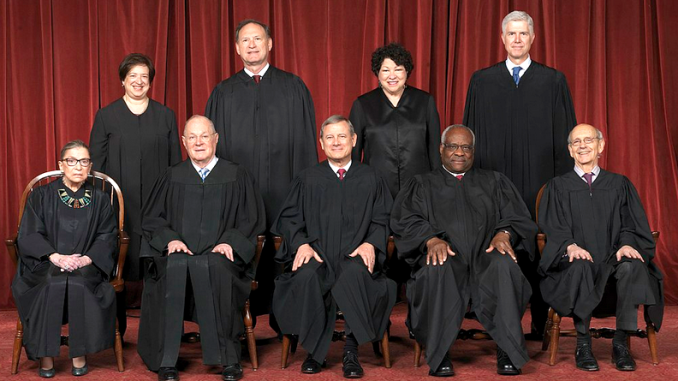
BY ALLISON LEVITSKY
Daily Post Staff Writer
The U.S. Supreme Court decision that government workers can’t be forced to contribute to unions that represent them in collective bargaining will likely lead to dwindling union memberships and reduced bargaining power for organized labor, experts told the Daily Post.
Stanford political science professor Terry Moe said the decision handed down on Wednesday (June 27) would likely lead to union membership dropping by anywhere between 10% and 25%.
“Public sector unions all play a big role in local politics,” Moe told the Post. “You would expect that politicians would be somewhat less beholden to them, somewhat less allied to them, so the policy outcomes would be at least somewhat less in their favor.”
As a result of yesterday’s decision in Janus vs. AFSCME, unions that will no longer be able to charge non-members for representation include the police, firefighters and teachers unions in Palo Alto and elsewhere.
Unions may need to start focusing more on bargaining than on funding politicians to keep attracting members, Moe said.
“I think that unions are going to start being more innovative in the way they approach potential members because now, if a union is the exclusive representative of a bargaining unit, then they automatically by law represent all of the employees in that bargaining unit,” Moe said. “What employees want is the union to focus on local-level benefits, and I think the unions can get a lot more support if that’s where they spend their money.”
It’s rare for police officers or firefighters to opt out of full union membership to pay what are called “fair-share fees,” according to Palo Alto’s HR head, Rumi Portillo.
Dues
Palo Alto firefighters pay $113.46 per biweekly paycheck, or almost $3,000 per year. Police officers and police brass pay between $1,300 and $1,430 per year for representation in the Palo Alto Police Officers’ Association and the Palo Alto Police Management Association.
John Wurdinger, president of the San Mateo County firefighters union, said that none of the districts in his union were collecting agency fees, meaning all the firefighters pay the full membership amount of $109 per month.
Chuck Bernstein, president of the Menlo Park Fire District, said that he saw more cohesion among firefighters’ willingness to pay dues to a union than other employees, like teachers, who he observed had a greater “diversity of opinion.”
“I’ve seen so much unity among firefighters, and there’s so much pressure to be kind of a good guy, that I would suspect it would be very difficult for any firefighter to opt out of union membership,” Bernstein told the Post.
Bernstein said he expects the decision to “severely reduce the pots of money” that are available for unions to support candidates and issues.
He said bargaining over benefits, including pensions, was problematic in local governments because “there’s only one side of the table. The employees control everything and there’s nobody sitting on the other side of the table for the taxpayers,” Bernstein said. “It’s very hard to overturn something when there’s only one side.”
Ruling will apply to teacher unions
Palo Alto teachers pay between $116 and $220 per year to the union, depending on how many hours they work. In the past, if an employee worked half-time or more, he or she paid fair-share agency fees because they received the benefits of collective bargaining, but that will change with the ruling.
Teri Baldwin, president of the Palo Alto Educators Association, said the teachers union is not very politically active.
“The focus of our work is supporting our members and collaborating with the district to continually improve teaching and learning in PAUSD,” Baldwin told the Post. “Our efforts have contributed to improvements in areas such as school safety, special education inclusion efforts, class size reduction and professional development.”
Over at City Hall, employees in the Utilities Management and Professionals Association of Palo Alto pay 0.5% of their salary to the union and employees in the Service Employees International Union pay 1.5%.
Palo Alto city workers represented by the Service Employees International Union pay 1.5% of their paycheck for union membership, but allow nonmembers to pay an agency fee of 0.93% for the costs of bargaining, according to Portillo.
Less union activism in Palo Alto lately
Palo Alto Vice Mayor Eric Filseth, who has led the charge in making the city’s labor negotiations more transparent, said he doubted the decision would have much of an impact in Palo Alto in the near future.
“Obviously at the state level public unions have been politically very active; but here in Palo Alto that just hasn’t been the case to anywhere near the same degree, and our labor relations have mostly not been terribly contentious,” Filseth said in an email. “So near term I suspect any effects in Palo Alto from Janus will be pretty small. Long term we’ll all have to wait and see.”




This decision comes too late I fear. The unions have put into office people whoincreased salaries, benefits and pensions to levels that are unsustainable. I don’t know how this excess will ever get reduced. The only solutions I see from the city is throwing more money at the pension debt. We’re in deep trouble.
This is a freedom of speech issue. Why should a city or state employee have to support a union if that employee disagrees with the union’s political agenda. Forced union dues required people to fund speech they disagreed with. If the unuon’s Agenda — things like partial birth abortion, open borders, socialized medicine — is so attractive, they have nothing to worry about when it comes to people having the option to quit the union. Bottom line —- nobody should be forced to join a union.